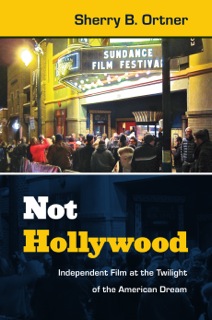Today we’re happy to provide you with an excerpt from Sherry B Ortner’s new book Not Hollywood. Subtitled “Independent Film at the Twilight of the American Dream”, its an ethnographic look at Independent Film since the late 80s. In this excerpt Sherry looks at the darkness that is endemic of so many independent features. What do you think?
Dark Indies
From the beginning of this project, I immersed myself in independent films. At first I was somewhat mystified. While many of them were compelling, many of them were also quite dark and, in one way or another, disturbing. They were clearly ‘‘not Hollywood.’’ This generated the first question of my research beyond the purely ethnographic: what was this all about? In Part I of this chapter, I tackle this general question of ‘‘darkness’’ and propose to understand it in terms of the generational positioning of a new breed of filmmakers, the first post-boomer generation usually known as Generation X. I argue further that ‘‘Generation X’’ represents not a particular cohort that ended at a certain point in time, but an ongoing and open-ended social entity that is bearing the brunt of the massive economic transformations called ‘‘neoliberalism.’’
In Part II of the chapter I then turn to specific sets of films that directly or indirectly address the conditions of life under neoliberalism in America. These include films classically associated with ‘‘Generation X’’ (Slacker, Reality Bites, and others), concerned primarily with the misery and/or insecurity of work in the neoliberal order. But they also include much darker films by/about immigrants struggling to survive not only in a neoliberal economy but in the long shadow of 9/11.
Part I: The Darkness of Independent Film
From early on in my viewing, I was struck by the extreme darkness (of mood, of tone, of look, of story) of many independent films.
Many of them range from very gloomy to ‘‘pitch-black’’ (Ansen [2007a: 65] on Se7en). Newsweek film critic Ramin Setoodeh recently complained that between 2005 and 2009 ‘‘roughly three fourths of all the films [nominated for Academy Awards] fixated on death’’ and described many films as ‘‘piling on the pain’’ in what ‘‘is starting to feel like Misery Porn’’ (2009: 70). David Denby of the New Yorker described a recent indie as ‘‘grating, almost punitive’’ (2010, on Margot at the Wedding). Hollywood-oriented producer/director Jennifer Farmer described independent films in general as ‘‘dark, dysfunctional, heavy, violent, twisted, alternative kinds of things’’ (quoted in Stubbs and Rodriguez 2000: 28).
Correspondingly, there is an assumption among many independent filmmakers that it is not necessarily a bad idea to make audiences feel uncomfortable, disturbed, and depressed. Gregg Araki, director of Mysterious Skin, said ‘‘he set out to create a movie that would devastate his audience’’ (in Hernandez 2004: 2). Filmmaker Rodrigo García, director of Nine Lives, said in an interview (field notes, February 10, 2007), that for him a film is only worth something if it really ‘‘beats him up.’’ Austrian director Michael Haneke is quoted as saying, ‘‘I’ve been accused of ‘raping’ the audience in my films, and I admit to that freely–all movies assault the viewer in one way or another’’ (in Wray 2007: 47). As with some of Haneke’s films, there may be extreme physical violence, and there is always a great deal of emotional violence. There is rarely a happy ending. While not all independent films are dark, disturbing, and depressing, so many are that I daresay this kind of film has, almost from the outset of the indie movement, defined the genre as a whole.
Of course, one can also find comedies in the world of independent film. But first of all, there are many fewer of them than of the dark and devastating sort of film. And second of all, the comedies themselves are infected with the prevailing darkness. There is no such thing as a straightforward comedy in independent film. At the most innocent end, a comedy must at least be describable as ‘‘quirky’’ (e.g., Little Miss Sunshine [Jonathan Dayton and Valerie Farris 2006]). Ratcheting the darkness up a notch, it might be described as ‘‘edgy.’’ For example, what is generally taken to be the founding film of the contemporary indie movement, sex, lies, and videotape (Steven Soderbergh, 1989) is described on its poster and dvd box as ‘‘an edgy, intense, comedy.’’ At the far end of the spectrum of dark independent comedy is a film like the Coen brothers’ A Serious Man (2009), about which critic Ramin Setoodeh wrote, ‘‘I had to get up and leave in the middle, it’s so depressing—and it’s a comedy’’ (2009: 70).
The darkness comes in several varieties. There may be emotional misery and depression, usually related to impossible relationships in which the characters are trapped. There may be extensive physical violence, sometimes embedded in those impossible relationships, and other times random and psychopathic. There may be deeply perverse sexual desires and relationships, such as pedophilia, sado/masochism, or incest; pedophilia alone is so prevalent in independent films that I will devote a whole discussion to it in chapter 4. All of these, singly and often together, add up to what is meant by some of the favorite vocabulary of independent film: dark, twisted, edgy.
Above excerpted from Sherry B Ortner’s Not Hollywood. Copyright Duke University Press, 2013
www.dukeupress.

Sherry B. Ortner is Distinguished Professor of Anthropology at UCLA. She is the author of numerous books including New Jersey Dreaming: Capital, Culture, and the Class of ’58 and Anthropology and Social Theory: Culture, Power, and the Acting Subject.





